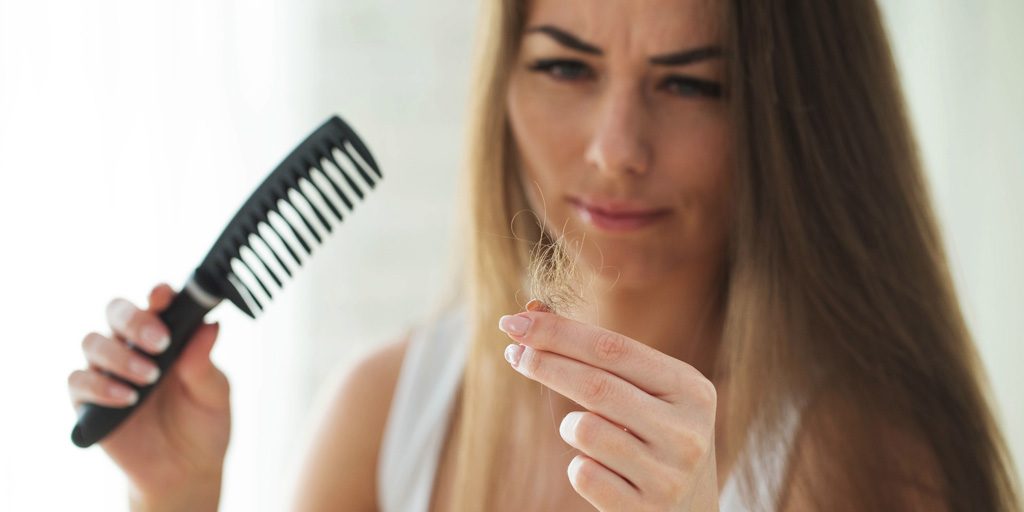What Causes Female Hair Loss?
Posted By:

Dr. Michael Coyle, DO FACOOG, FPMRS

Why is My Hair Falling Out? Causes of Female Hair Loss
It’s in your brush, on your pillow, in the bathroom sink, everywhere but where it should be – on your head! Hair loss is a common complaint among women who are concerned not only about their
What are the Causes of Female Hair Loss?
Many cases of female hair loss are caused by a hormonal imbalance. For example, estrogen is related to hair growth and hair loss. When estrogen levels are high, hair appears thick and healthy. When estrogen levels take a sudden drop, such as after pregnancy or during menopause, more hair follicles enter the “resting” phase and end up resting in the shower drain. Hair can quickly become noticeably thinner and even patchy.
This is all because our hormones work together in a complicated, delicate balance. Sometimes they give each other a boost; sometimes they keep each other in check. When estrogen is lowered it gives more power to the androgens, or male hormones, such as testosterone. This can cause numerous issues, including hair loss.
Androgenetic alopecia, or male or female pattern baldness, was once thought to be caused by testosterone, whether it was occurring in women or men. But testosterone itself is not solely to blame for hair loss. In cases of androgenetic alopecia, the body converts testosterone to dihydrotestosterone reductase (DHT). High levels of DHT make it bind to receptors in the scalp’s hair follicles, shrinking the follicle and killing the hair at the root.
Women have a relatively minimal amount of testosterone, but it’s enough to cause DHT- triggered hair loss in women. And when estrogen decreases and testosterone takes over, DHT is even more of a problem.
Know your options and live the life you want.
Schedule an Appointment TodayHow Can You Treat Hormone-Related Hair Loss in Women?
Hormone replacement therapy (HRT) can be effective in stopping female hair loss in women of all ages. Once your provider takes your medical history, tests your hormones and determines that a hormonal imbalance is at the root of your hair loss, he can work with you to develop a custom HRT treatment plan.
What is HRT?
HRT is typically prescribed to menopausal women to lessen uncomfortable symptoms of menopause, such as:
- Difficulty sleeping
- Hot flashes
- Night sweats
- Moodiness
- Loss of Libido
HRT can also help prevent osteoporosis, a bone-thinning condition that is also related to a drop in estrogen levels. HRT usually means using estrogen and progestin together. Women may get these hormones in varying forms, including estrogen and progesterone creams. By balancing the hormones and correcting the level of estrogen, HRT can put testosterone in its place and prevent the formation of follicle-killing DHT.
HRT for Hair Loss: Benefits and Risks
HRT is a very effective hair loss treatment for some women who are good overall candidates for the therapy. HRT has benefits for both general health and menopause symptom management, but also has side effects, which can include:
- Slightly increased risk of breast cancer
- Higher risk of dying if you do get breast cancer
- Increased risk of uterine cancer if estrogen delivered with progesterone
- Increased risk of heart disease and stroke
- Increased risk of blood clots
- Abnormal vaginal bleeding (which will need to be evaluated to rule out the possibility of uterine cancer)
- Nausea and bloating
- Irritability
- Frequent headaches
- Sore breasts
Your doctor will take a full medical history, test your hormone levels and talk to you about the risks and benefits of HRT. If you are prescribed HRT, it is important to take the lowest effective dose and to only take the drugs for the shortest amount of time needed to control symptoms and get your crowning glory back in shape!
HRT can be effectively delivered through customized HRT creams. Birth control pills can decrease the production of ovarian androgens and can also be used to treat women’s androgenetic alopecia in some cases.
Don’t let thinning hair damage your self-esteem – there are solutions! Contact the expert and compassionate team at Coyle Institute and we’ll find the cause of your hair loss and help you get back your confidence! Call us today to set up your consultation!
